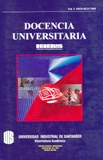La Evaluación del docente en la Universidad Cooperativa de Colombia, un proceso en construcción permanente
Publicado 2005-05-04
Cómo citar
Resumen
Resumen
La evaluación docente en la Universidad cooperativa de Colombia es tomada como un proceso permanente de construcción, empezando desde los procesos de reflexión relacionados con el hecho educacional que ha surgido como un gran concepto, donde la evaluación debería ser esperada como un elemento pedagógico, activo y dinámico, como una oportunidad para construir, como una expresión de valores sociales concretos que se encuentran en el ambiente y en los actores. Entonces surge un problema: ¿Qué podemos hacer para transformar la evaluación docente en un espacio de enriquecimiento profesional y en el mejoramiento de la calidad de la educación manejada en la universidad?
El surgimiento de la especialización en docencia universitaria promovió un marco de reflexión sobre la cibernética social y su ciclo de Transformación, y además originó la propuesta: “Evaluación como Pedagogía o Acompañamiento”, conocida como el permanente proceso investigativo que incluye una perspectiva holística y global en la cual el objeto puede ser apreciado bajo las circunstancias que lo rodean y la transformación de las personas involucradas debe ser prudente, teniendo en cuenta qué tan lejos han llegado nuestras metas sobre aprender a conocer, aprender a hacer y aprender a ser.
Desde esta perspectiva, el docente será evaluado en sus dominios:
Cognoscitivo: conocer dimensiones investigativas y científicas.
Praxiológico: dejar hacer o dimensiones pedagógico-didáctica y comunicativa.
Axiológico: dimensión humana, sentido ético y estético y dimensión psicosocial.
Al alcanzar esto, un gran consenso será establecido. Un consenso que permita la auto evaluación, la coevaluación, la heteroevaluación y la meta evaluación y que conduzca entre los participantes el sentimiento de haberse enriquecido al formar parte de la evaluación, sintiendo que su pensamiento fue conmovido y que su comprensión fue desarrollada.
Palabras claves: Evaluación Docente, Calidad, Cibernética Social, Pedagogía del Acompañamiento, Holístico, Dominios: Cognoscitivo, Praxiológico y Axiológico.
SUMMARY
The teaching evaluation at Universidad Cooperativa de Colombia is taken as a permanent construction process, starting from the reflection processes related to the educational fact that have come up notion wide, where the evaluation should be expected as a pedagogical, active an dynamic element, as a chance to construct, as a expression of the concrete social values found in the environment and in the actors and then a problem is set: ¿what can we do to have the teaching evaluation transformed into a space of professional enrichment and of the quality improvement in the education that is managed in the university?
The emergence of the University Teaching Specialization promoted a reflection frame of the Social Cybernetics and its Transformation Cycle, and also originated the proposal: “Evaluation as Pedagogy or Accompaniment”, know as the permanent investigative process that involves a holistic and global perspective in which the object can be appreciated under the surrounding circumstances and the transformation of the involver people should be considerate, noticing how far we have reached the goals about learning to know, learning to do and learning to be.
Since this perspective, the teacher will be evaluated in his/her dominions:
Cognitive: to know, investigative and scientific dimensions.
Praxiologic dominion: laisser faire or pedagogical – didactic dimension and communicative dimension.
Inside the axiologic dominion: Humanist dimension, ethical and aesthetic sense and psicosocial dimension.
To reach this, a wide consensus will be established which allows the self-evaluation, the coevaluation, the heteroevaluation, and the metaevaluation and conducts among the participants the feeling of have been enriched when taking part in the evaluation, and that their thought has been moved and their comprehension has been developed.
Key Words: Teaching evaluation, Quality, Social Cybernetics, Pedagogy of Accompaniment, Holistic, Dominions: cognitive, praxiologic, axiologic

